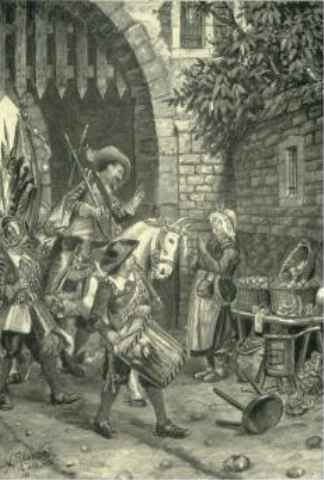Jan and Griet

Jan
und Griet
Nach einem Aquarell von Josef Passavanti
"There lived at Cologne on the old farm of
Kümpchenshof
a peasant who had a maid called Griet and a man-servant called Jan."
Thus begins the old well-known Rhenish song of
"Jan van
Werth," the celebrated general of the imperial cavalry at the time when
the
Swedes and French were taking advantage of the civil war in Germany.
But
nobody except the inhabitants of the holy City of Cologne, knows that
Jan
van Werth was originally a simple labourer, and that he was indebted
for
his luck in life to his bad luck in love.
Jan was an industrious farmer-boy with an upright
character
and a handsome face.
Many a girl would not have rejected him as a
sweetheart,
but Jan's tender heart had long been captivated by the good looks of
pretty
Griet, the comely maid of the Kümpchenshof. His love could not
long
remain a secret. One day he confessed to her with sobs that he loved
her
dearly, and would with pleasure work and toil for her twice as much as
he
then did for his master. He spoke long and earnestly, and taking
courage
with every word he uttered, he at last put to her the all-important
question
– would she become his
wife?
Laughingly the pretty girl put her round arms
akimbo,
tossed her head back and looked at her honest suitor with a mocking
twinkle
in her eyes. Then she shook her head energetically and said: "You are
only
a farmer's labourer, my dear boy, and will remain one most probably all
your
life. True, it is not your fault, but all the same I should prefer to
marry
a rich farmer with cows and oxen and horses."
Bitter anger rose in Jan's breast on hearing her
talk
so heartlessly, but he controlled himself. "Just as you like," he said
sadly,
and turned away from the haughty maid.
From that day he could not endure any longer the
life
at the farm, and pocketing his wages, he said good-bye for ever to the
Kümpchenshof and became a soldier.
It was a furious war in which the German Emperor
was
engaged against the enemies of his country, and brave soldiers were
rare.
Any valiant warrior might distinguish himself and become an officer at
that
time.
The farmer-boy, Jan, soon won by his bravery and intrepidity
the esteem of his superiors, and was promoted to the rank of colonel.
Once
when fighting against the Swedish troops he showed such determination
and
courage that he won the battle. After this brilliant act he was made a
general.
But the name of Jan van Werth became even more famous when he beat the
French
in a skirmish at Tüttlingen.
In another way also his good luck reconciled him
to the
first bitter disappointment caused for by Griet's scornful answer. He
married
a lovely and noble young lady, who was very proud of becoming the wife
of
such a celebrated general.
Let us now look back and see what happened in the meantime
to Griet. She had waited month after month and year after year for the
rich
farmer. But the longed-for suitor never made his appearance. Even in
those
by-gone days red cheeks and bright eyes were much less thought of than
ducats
and glittering gold.
As time went on Griet grew old, and though she
would
now have been content with a simple man for her sweetheart, not even
such
a one condescended to ask her to become his wife.
Little by little Griet gave up all hopes of ever
marrying,
and had to look out for a living to keep her in her old age from
starving.
Therefore she started a fruit stall at one of the large gateways of
Cologne.
One day the good inhabitants of this town were in
great
excitement, and crowded in their best Sunday-clothes round the gate of
St.
Severin, where Griet sat at her apple-stall. They had come to meet Jan
van
Werth, the celebrated general, who was returning victorious at the head
of
his regiment.
There he was sitting on a powerful charger which
was
gorgeously covered with gilded trappings. On his fine head Jan wore a
broad-brimmed hat with a flowing feather. Behind him rode his splendid
soldiers.
The body-guard of the town beat the drum enthusiastically, and the
Cologne
people called out: "Long live our Jan van Werth!"
When the celebrated general passed the gate, he stopped his
horse just in front of Griet's apple baskets, .and looking down upon
the
old wrinkled woman, met her questioning glance with an odd smile. "Ah
Griet,"
said he slowly, "whoever would have thought it?" At the sound of his
voice
an expression of sudden recognition passed over her worn features, and
she
muttered sorrowfully, but still audibly to the proud rider, "Oh, Jan,
if
I had only known it!"
A magnificent monument in the form of the statue
of Jan
van Werth now stands in the centre of the old market of Cologne.
It was erected there in memory not only of the
heroic
deeds of the brave general, but also as a warning to all Cologne
maidens
not to reject their suitors because they are poor, for one day, like
Jan
van Werth, they may become famous, and then they will not, like Griet,
have
to sigh over things that "might have been."
Click
 to go to the next
section of
the Legends of the Rhine to go to the next
section of
the Legends of the Rhine
|

